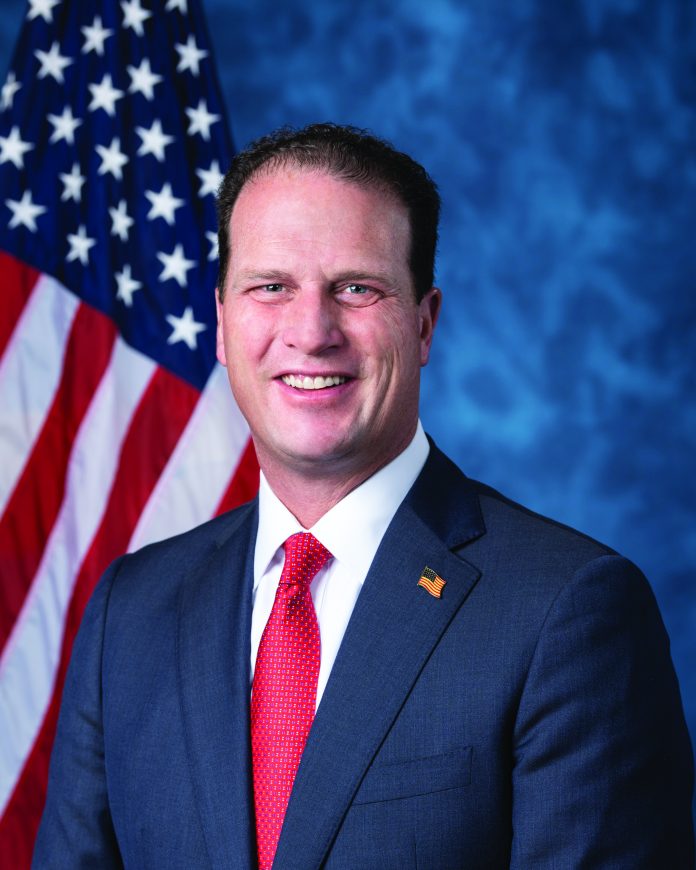WASHINGTON, D.C. Congressman August Pfluger wrote a bill that’s included in the U.S. House Republicans’ new Lower Energy Costs Act package to repeal the new methane fee set by the Biden administration’s Inflation Reduction Act.
“I am incredibly proud that my bill, the Natural Gas Tax Repeal Act, to strike President Biden’s new tax on oil and gas producers is a major component in the House of Representatives’ energy package that we are bringing up for a vote in just a few weeks,” Pfluger said Wednesday.
“I spent two decades in the military and I’ve seen the consequences of countries following the path of failed energy policies. If President Biden’s administration continues to steer America’s energy policy down these failed paths, everything crumbles from the economic foundation to the social structure and our national security is weakened in the process.”
The San Angelo Republican said the administration “has doubled down on their false reality of an energy transition, but our region understands better than most that we are in an energy expansion, not a transition.
“Thankfully, House Republicans stand in the way of President Biden and his radical anti-energy agenda,” said Pfluger, who represents Ector and Midland counties in the 11th Congressional District. “The Republican energy package will make it easier for producers in the Permian Basin to supply our nation with affordable, reliable and secure energy.
“We want to incentivize production here at home and restore American energy independence so that we will never rely on our adversaries for energy.”
Pfluger’s bill would nix the fees for certain facilities that exceeded the EPA’s methane emissions thresholds, which starting next year would be $900 per ton, in 2025 $1,200 per ton and in each year thereafter $1,500 per ton.
Filed March 9 as House Resolution 1, the bill is the GOP’s top priority for the 118th Congress, Speaker Kevin McCarthy said.
It would also speed up the approval process for energy and drilling on federal lands, limit states’ abilities to block projects like pipelines, prohibit a ban on fracking, limit the president’s authority to block cross-border project permits like the Keystone XL Pipeline, remove restrictions on natural gas imports and exports and repeal the parts of the Inflation Reduction Act that provided funding to address climate change and pollution.

State Rep. Brooks Landgraf commented on the bill along with Texas Independent Producers & Royalty Owners President Ed Longanecker, Texas Oil & Gas Association President Todd Staples and Texas Alliance of Energy Producers Petroleum Economist and Executive Vice President Karr Ingham.
Landgraf said from Austin Wednesday that he was “so thankful we have leaders in the U.S. House like Congressman Pfluger who understand the importance of American oil and natural gas production and are willing to fight back against the coastal elites.
“Hopefully this is a sign of more good things to come for Texas and every other place on earth where freedom reigns over tyranny,” the Odessa Republican said. “Texas oil and gas is not only the bedrock of our state’s economy, it’s a key to long-term U.S. national security interests.
“Our federal leaders are in my prayers and I remain full of hope that they will ultimately do what is best for our nation,” Landgraf said. “In the meantime, I’m doing everything I can on the state level including working to prevent unnecessary regulations as chairman of the House Environmental Regulation Committee and addressing the workforce and infrastructure needs of our major energy producing regions and ports with my Texas STRONG bill.”
Longanecker said restricting federal governmental meddling is a must.
“In order to meet record energy demand, we need less red tape around critical energy infrastructure like pipelines and export terminals and a consistent, predictable regulatory environment that encourages investment in essential energy,” Longanecker said Wednesday from Austin. “Federal policies should make it easier, not harder, to produce the energy we need to power our daily lives and we look forward to a robust discussion focused on these priorities in the months ahead.”
Staples said policy-making can be helpful or hurtful.
“Policy can promote prosperity or it can hinder it,” Staples said from Austin. “After an onslaught of efforts focused on restraining domestic production, we appreciate the House’s focus on lessening America’s dependence on foreign-produced resources and encouraging increased domestic investment and production to create jobs here at home, grow our economy and keep the United States the world’s energy leader.”
Ingham said Biden’s agenda “is decidedly anti-oil and gas, especially U.S.-produced oil and gas.
“Taking many forms, public comments, executive orders, Democrat-designed legislation, regulation from EPA and others, that agenda has been apparent since virtually the president’s first day in office,” Ingham said Wednesday from Amarillo.
“During that time the Democrats controlled every branch, though the tie in the Senate meant they had to coax Sen. Joe Manchin of West Virginia and one or two others along to get anything passed. This was finally accomplished with the vote on the gargantuan anti-oil and gas and anti-free market, never mind foolishly named, Inflation Reduction Act.”
Ingham said American consumers would benefit greatly from the passage of the Lower Energy Costs Act, which Democratic Senate Majority Leader Charles Schumer of New York says he will oppose.
“The consumers would suffer under the weight of an energy mix that’s heavily subsidized in favor of renewables and simply cannot do the job of supplying the U.S. economy with abundant, affordable, reliable energy on a sustainable basis for decades to come,” Ingham said. “This broad package accomplishes much of that and we are in support.
“We also strongly support the bill Rep. Pfluger has introduced to repeal the ill-conceived methane tax, which is an illogically designed and damaging assessment on U.S. oil and gas operators and others that would potentially shut in thousands of wells, lower U.S. domestic production for which foreign-produced products would likely fill the gap and endanger small independent oil and gas companies by making their production uneconomic.”
Asked if HR 1 can pass the House, where the Republicans have only a 222-213-seat majority, and Senate, controlled 51-49 by the Democrats, the economist said, “Yes, these are incredibly unifying issues for the Republicans in Congress and while only time will tell, we are very optimistic that these bills and packages will indeed pass the House.
“As you know, the problems then lie in the Senate, which is Democrat-controlled. Two of those Democrats are moderates, Manchin and Jon Tester of Montana, both of whom are up for reelection in 2024. So there are some potential paths forward for parts of that legislation and some of those issues.
“And then the problem becomes the White House veto, of course. But it is time to tee these issues up for the American consuming public to help demonstrate the contempt that anti-fossil fuel Democrats seem to have for them and their economic well-being.”




